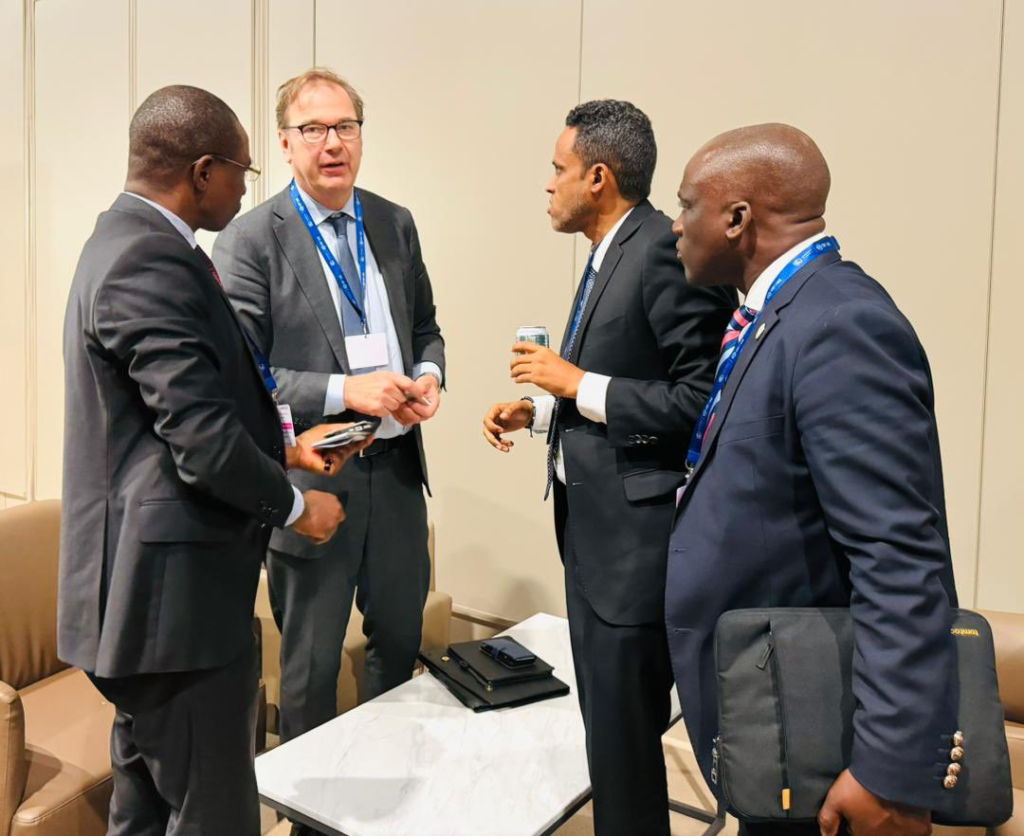*Featuring Contributions from TADB CEO and AGRA Tanzania Director
Hon. Hussein Bashe, Tanzania’s Minister of Agriculture, engaged in strategic discussions with Martien van Nieuwkoop, the Global Director of Agriculture and Food Global Practice at the World Bank, at the 28th Conference of the Parties (COP28) to the United Nations Framework Convention on Climate Change in the United Arab Emirates.
The high-level talks encompassed a range of critical agricultural issues, focusing on empowering rural communities, alleviating poverty, fostering a sustainable green economy, and enhancing crop production efficiency. These discussions are particularly timely as Tanzania endeavors to modernize and elevate its agricultural sector to new heights of productivity and sustainability.
Representing Tanzania’s determination, Minister Bashe emphasized the nation’s commitment to transforming its agricultural landscape. He highlighted the importance of improving the livelihoods of farmers and the broader impact on the nation’s economy. Recognizing the World Bank’s crucial role, he applauded their ongoing support in helping Tanzania meet its ambitious agricultural objectives.
In response, Mr. Martien reaffirmed the World Bank’s dedication to supporting Tanzania’s agricultural development. The World Bank pledged continued financial and technical assistance, underscoring the World Bank’s commitment to aiding Tanzania in realizing its vision for a robust and sustainable agricultural sector.
The dialogue also featured significant contributions from Mr. Frank Nyabundege, the CEO of the Tanzania Agricultural Development Bank (TADB), and Mr. Vianey Rweyendela, the Country Director at AGRA in Tanzania. Their participation underscores the collaborative effort and multi-stakeholder engagement necessary for transformative change in Tanzania’s agriculture.
To support these efforts, the Tanzanian government has prioritized investments in vital areas such as irrigation infrastructure, access to quality seeds and agricultural inputs, and the enhancement of agricultural education and training. These initiatives are pivotal in shaping a more productive, efficient, and sustainable agricultural sector, aligned with global environmental and economic goals.
Looking ahead, the outcomes of these discussions at COP28 are anticipated to play a critical role in shaping the future trajectory of Tanzania’s agricultural sector, marking a new era of collaboration and innovation in agricultural development.
The enduring partnership between Tanzania’s Ministry of Agriculture (MoA) and the World Bank exemplifies a dynamic collaboration that is significantly transforming the agricultural landscape of Tanzania. This alliance has been pivotal in advancing food security, reducing poverty, and fostering rural development, marking a new era in the country’s agricultural progress.
In a major development, the World Bank sanctioned a substantial $300 million funding in May 2023 for the Tanzania Food Systems Resilience Program (TFSRP). This program is designed to empower at least 300,000 Tanzanian farmers, with a notable emphasis on women, representing nearly half of the beneficiary demographic. It aims to provide them with innovative, resilience-enhancing technologies and practices. This initiative is set to markedly boost agricultural productivity, leading to a stronger and more stable food system.
The TFSRP goes beyond immediate assistance, planning to extend access to essential assets and services to an additional 1.8 million farmers. This expansion is pivotal for fostering inclusive growth and ensures that the benefits of the program permeate through various layers of the agricultural community.
Tanzania’s role in the TFSRP is part of a larger, regional initiative that encompasses the Food Systems Resilience Program (FSRP) for Eastern and Southern Africa. This expansive program, with a total budget of $903 million, is crucial for the second and third phases of the FSRP and includes financial allocations to several nations and organizations in the region, including Comoros, Kenya, Malawi, Somalia, and the African Union Commission, alongside Tanzania.
This regional approach underscores the need for collective action in addressing the challenges faced by food systems, highlighting the importance of solidarity and shared efforts in tackling these issues.
Key Areas of Cooperation and Development:
Financing Agricultural Development: The World Bank’s commitment to Tanzania’s agricultural ambitions is evident through the allocation of a $300 million budget for the TFSRP under the Program for Results (PforR). This funding, provided by the International Development Association (IDA), is a testament to the World Bank’s dedication to support Tanzania through concessional financing.
Implementing ASDP II: The TFSRP aligns with Tanzania’s broader Agriculture Sector Development Program II (ASDP II), focusing on three essential result areas:
Enhancement of service delivery in research, extension, and seeds
Development of resilient rural infrastructure
Strengthening fiscal performance for investments in priority areas
This strategic alignment ensures that the TFSRP not only complements but significantly contributes to the success of ASDP II, making it an integral component of Tanzania’s agricultural development.

